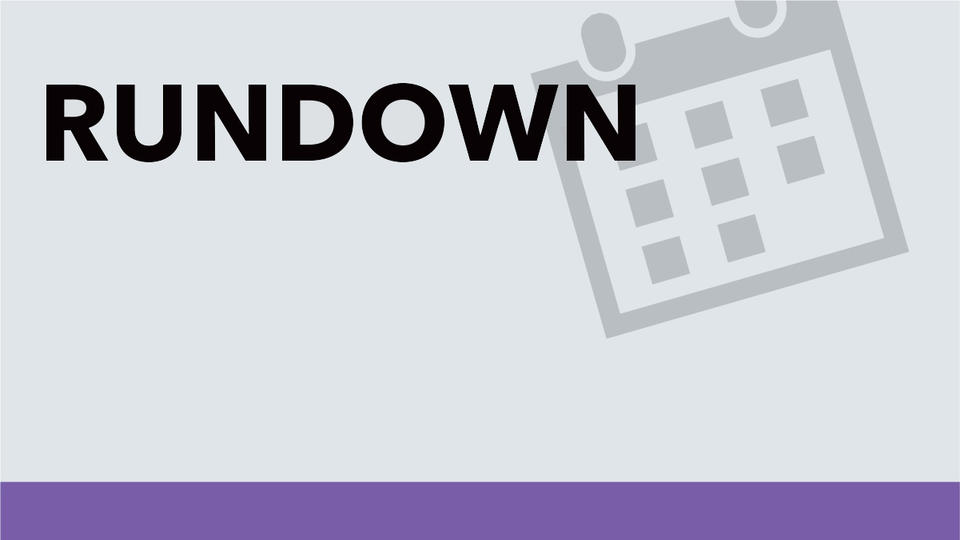
Newsfeed
Rice Business in the news
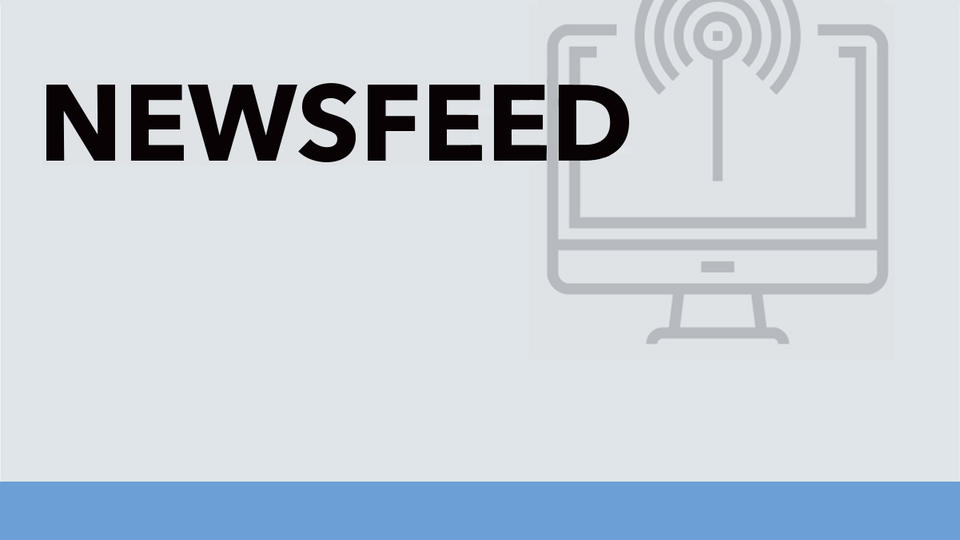
Rice Business in the news

Meet The Rice Jones MBA Class Of 2022
“As an entrepreneur, it was important that I be in an entrepreneurial environment,” explains first-year MBA student Sophie Randolph. “I found this type of environment at Rice alongside myriad resources available to me will help me propel my entrepreneurial pursuits forward. Courses like the Entrepreneurship Labs, as well as resources such as Rice’s Lilie Lab, OwlSpark, and the Rice Alliance provide opportunities to work on growing my business while in school.”
October 14, 2020 | Jeff Schmitt

Two Houston universities’ entrepreneurship programs rank No.1 in Princeton Review
This marks the second consecutive year the two Houston universities have topped the list of entrepreneurship programs. For Rice’s Jones Graduate School of Business, this is its fifth time in a top 3 position nationally and the 12th year in a row ranked it has ranked in the top 10 graduate entrepreneurship programs.
“Earning the top spot again this year, and our decades-long leadership in entrepreneurship education, is a testament to our visionary and world-class faculty, the enormous success of the Rice Business Plan Competition, and of our commitment to our students and the community we serve,” Peter Rodriguez, the dean of the business school, said.
November 17, 2020 | Rebecca Carballo, Staff Writer

Deadly winter storm adds another layer of woe for struggling Houston workers
“It’s a kick while you’re down to all of the service industries, restaurants and others who were already battling through the pandemic,” said Peter Rodriguez, an economist and dean of Rice’s Jones Graduate School of Business. “So regrettably, it really exacerbates the pain for them, more than it creates new pains for other industries in particular.”
As for long term impacts, Rice’s Rodriguez fears employers may think twice about relocating their businesses, both to Texas generally and to Houston — no stranger to natural disasters — in particular. He said the prolonged outages could make it look like the state has unreliable infrastructure. “It’s true that this is very rare, but that’s not the way it will play into the memories of people making investment decisions,” Rodriguez said. “They’ll wonder about just our overall ability to manage crises.”
February 22, 2021 | R.A. Schuetz, Rebecca Carballo, Paul Takahashi, Staff Writers

As Buildings’ Life Spans Shrink, Developers Try to Adjust
Statistics illustrating the acceleration of building life cycles are scarce, but experts in the industry are starting to take heed. “The cycle of changing is becoming shorter,” said Jefferson Duarte, associate professor of real estate finance at Rice University. Projects that developers once could have collected rents on for half a century or more don’t allow that anymore. “Twenty years ago, we didn’t think about it,” Professor Duarte said. There was just an assumption that an office building would still be functioning a century later.
February 23, 2021 | Kevin Williams
Kyle Judah, executive director of Rice University’s Liu Idea Lab for Innovation and Entrepreneurship
“One of the things I found so exciting about what’s going on in Houston right now that, quite frankly, was incredibly attractive about the opportunity to come and join Lilie and Rice was that Houston has these big pillar companies in energy and health care and all these critical areas that the world, the economy, and the society needs,” Judah says in a September episode of the Houston Innovators Podcast. “That’s all in Houston right now.”
January 6, 2021 | Natalie Harms

Rice University adds first undergraduate business major
“There’s a demand for deeper business education from our current and prospective students, and Rice Business can deliver to undergraduates the high-quality degree programs we have always delivered to MBAs, Master of Accountancy and Ph.D. students,” said Peter Rodriguez, dean of the Rice’s Jesse H. Jones Graduate School of Business.
The business major will offer leadership and business fundamentals, the university said, including accounting, finance, marketing, organizational behavior, strategy and communications. Students are required to concentrate in finance or management.
“We strive to be a forward-thinking business school for the next generation of global leaders,” Rodriguez said in a school announcement. “I am thrilled to say we will now be educating tomorrow’s leaders a little bit sooner.”
March 1, 2021 | Laura Gillispie

Best Places for Valentine’s Day
“Lower consumer confidence and uncertainty about the overall economy will shape Valentine’s Day spending trends — not the other way around,” wrote Constance Porter, assistant clinical professor of marketing at Rice Business, for WalletHub.
Over the past couple of years, Americans who felt good about the economy and their personal finances fueled strong spending on Valentine’s Day gifts, according to data published by the National Retail Federation. But this year, Porter believes, the pandemic will dampen Valentine’s Day spending.
She suggests more people will opt for alternative ways to celebrate at home — such as cooking a restaurant-style meal or taking online courses for at-home spa treatments. It’s the “physical labor of love” that will make these experiences special, Porter said.
February 2, 2021 | Adam McCann, Financial Writer

Duncan Dickerson ’16 Named to the Forbes 30 Under 30 List
Dickerson helps advise the world’s biggest oil companies on how to navigate the great carbon transition by divesting old fossil fuel assets while shifting investment toward renewable energy and carbon capture projects.
Helped arranged $100 billion in energy company restructurings this year.
First job: “I had a vending machine business during high school. By my senior year I had over 400 locations across Texas and generated more than $100,000/year of revenue.”
Editors: Christopher Helman and Eliza Haverstock
Keep Exploring
Class Notes
News and Notes from Rice Business Alumni

News and Notes from Rice Business Alumni
Paula Wagner ’20
Paula Wagner and her husband, CJ Wagner, welcomed their first child, baby Elizabeth “Elle” Rey Wagner on Oct. 25, 2020.

Sean McKenzie ’19
Sean recently joined the M&A Strategy, Diligence and Value Creation practice at Deloitte Consulting. The group helps clients with portfolio strategy, finding pathways to growth and value creation through M&A and diligence.
Daniel Barvin ’18
Daniel has joined Coya Therapeutics, a clinical stage cell therapy platform company developing first-in-class therapeutics for ALS and other neurodegenerative diseases, as a project manager. His role will be to assist in the commercialization of a novel therapy for ALS and other neurodegenerative diseases.
Tyler Watkins ’18
Tyler is excited to announce the birth of his daughter, Rylan Ella. Rylan was born on Aug. 9, 2020, so she is already almost 7 months old and clearly the coolest kid in school.

Meg Schneider ’17
Meg has taken on a new role as a consultant at ZoomRx, a life sciences consultancy, in New York.
Samantha Lewis ’17
Samantha is now a principal at Mercury Fund. She is proud of the work she has done in the last three years at Goose Capital. Innovation is the key to solving many of society’s systemic issues, and she believes Mercury is a platform where she can make a significant impact as an investor. Samantha remains committed to helping serve underrepresented founders and is grateful to do that alongside her new colleagues at Mercury.
Emily Doyle ’17
Emily joined Macquarie Commodities Trading at the end of 2019 as a vice president on the physical oil team after many wonderful years with Shell Trading. Emily still lives close to Rice with her husband Elliott (Rice MA ’19), and two children, Elliott (3) and Isabelle (2).
Chelsea Greenwald ’17
Chelsea moved to Boston in November to take a role as a senior manager with Amazon Robotics. She and Chad are expecting their first baby in April!
Charlie Groover ’17
Charlie and his wife, Kathleen, started a new business in 2020 named Yard Vibes based out of Katy, TX. The business is focused on creating special moments for friends and loved ones during birthdays, graduations, retirements, engagements and other life events through staked yard messages. Business has picked up quickly and it’s been really exciting and rewarding to make connections with people during their special moments and milestones. More info can be found at yardvibestx.com.

Katherine (Butler) Mitchell ’17
Katherine and Justin welcomed their son, James David de Cordova Mitchell, on April 3, 2020.

Nick Girardi ’16
Nick accepted a new job as director of treasury and investor relations with WillScot Mobile Mini. Caroline, Jillian, Nick and the two dogs are moving to Phoenix.
Leila (Zomorrodian) Aloi ’16
Leila and husband Gaspare ’16 welcomed a baby boy, Remy Aloi, on Jan. 10, 2021.
Lindsay (Graves) Hernandez ’16
Lindsay was promoted to senior marketing manager, leading both the Downstream Sustainability and Petrochemicals teams for Nalco Water, an Ecolab Company. She and Jose recently welcomed their second daughter, Gemma Quinn Hernandez.
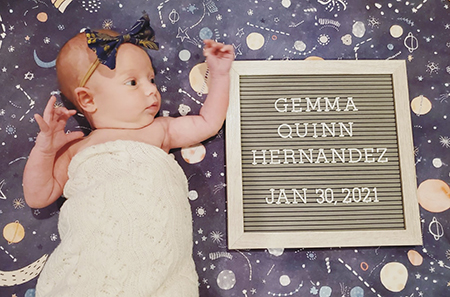
Rani Puranik ’14
Co-owner and Global CFO of Houston-based Worldwide Oilfield Machine, Rani Puranik thrives at leading innovation, empowering others and inspiring collaboration. Rani and her father have led the privately held corporation to grow to more than $350 million in annual revenues. Rani’s debut book, “Seven Letters to My Daughters,” is slated to launch in 2021. This life lessons-focused memoir is from the perspective of a mother writing letters of encouragement and advice to her daughters. She realized that her life has been lived in seven-year phases, and she shares her experience as a woman and how womanhood has changed within each phase.
Atul Tripathi ’13
Atul used his COVID quarantine time to write a book on operational excellence, titled “Managerial Perspective to Operational Excellence: Using Lean Ideas to Compete Against Low-Cost Countries.” The book uses a case-based approach for lean implementation and presents a summary of lessons learned and insights on change management. A first-person story-based approach used in this book makes it an engaging read for operations leaders and middle management as well as postgraduate students. The book is available for pre-order on Amazon.
Lloyd Ackermann ’13
Lloyd is now the chief strategy officer for a management consulting firm in California focused on leading business owners, entrepreneurs and executives through organizational transformation and reinvention to redefine their strategic goals and resolve their most difficult challenges at times of tremendous turmoil (e.g. COVID-19). He is moving to California with his wife, Delphine, and two children, Charlie (5 years old) and Leo (7 months old). Rice University and the Jones School have brought Lloyd to the best of his abilities professionally and he cannot thank enough the staff, professors and community for this amazing journey he is living today. Please feel free to reach out!
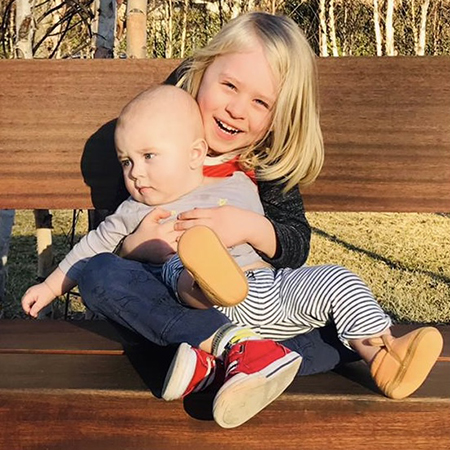
Britton Russell ’13
Britton has been appointed CFO of Genapsys, Inc., a privately held genomics and Next Generation Sequencing company with headquarters in Redwood City, CA.
Fernando Magalhaes ’12
After moving out of Texas right after graduation, Fernando just returned to Texas and is now living in the outskirts of Austin.
Priyanka Rao ’12
Priyanka has accepted a role with Amazon as a senior program manager.
Alison Young ’11
Alison recently became an executive director with JPMorgan Securities, a division of JPMorgan Wealth Management. In this role, in her continued wealth management career, she continues to advise high and ultra-high net worth clients and families on investment and wealth planning decisions.
Sharmin Ashtaputre ’10
Sharmin has joined the Federal Reserve Bank of Dallas as an assistant vice president in the corporate planning department. In this role, she will identify strategic needs for the Dallas Fed and drive the development of department-level strategic plans and objectives. Sharmin comes to the bank with more than 10 years of experience in management consulting, primarily in the health care industry, with a focus on operations management, strategic planning, organizational change and project management.
Linhua Guan ’10
On Jan. 30, 2021 Surge Energy signed a purchase and sale agreement to acquire leasehold interest and producing wells from Grenadier Energy Partners II LLC in Howard County, TX, for the aggregate purchase price of approximately $420 million. The transaction was expected to close in the first quarter of 2021. Linhua Guan is the CEO of Surge Energy America and the company was the only E&P company recognized for both the Best Places to Work and Middle Market 50 awards by Houston Business Journal in 2020.
Cameron (Dyer) London ’08
On Nov. 17, 2020 Cameron welcomed a daughter, Sloane London, into the world. She couldn't be happier!

Luka Erceg ’07
The Association of Insolvency and Restructuring Advisors recently certified Luka as a Certified Insolvency and Restructuring Advisor. Luka is the managing director of Erceg Partners in San Diego, a firm focused on turnarounds and restructurings of investment funds for investment managers, institutional investors and asset managers when faced with “zombie” fund issues.
Ross Pearo ’00
Ross started a new role at Harvard University in the early days of the COVID-19 pandemic as executive director of strategic planning and marketing at the division of continuing education. As a member of the senior leadership team, he is responsible for overseeing strategy, marketing operations and professional development programs. He had previously been at Harvard Business School Online (formerly HBX) where he held a variety of roles in marketing, product management and business development.
Julian Bott ’90
Julian Bott passed on Jan. 3, 2021 in Houston. He was born in Cambridge, England, studied at Millfield School in Somerset and Harvard College in Cambridge, Mass. Julian’s career began in New York City with Banker’s Trust. He relocated to Houston, where he enjoyed a successful career in commercial banking within the oil and gas industry. Julian balanced his full-time career while simultaneously obtaining an MBA at Rice. Julian served as a board member at EQM, as the EVP and CFO of Sandridge Energy, and as the EVP and CFO of Southwestern Energy, where he led the recent acquisition of Montage Resources and continued his role until the time of his passing. He is survived by his wife Cecile, his mother, Gillian, and two sons, Ian (Rice 2014) and James (Rice MBA 2019). To those who enjoyed his comradeship, he truly loved and admired you. He found joy in your success and he would encourage you to live on pursuing excellence.

Keep Exploring
Luis Rodriguez EMBA '22
How the EMBA program is helping Luis Rodriguez '22 take his career to new heights
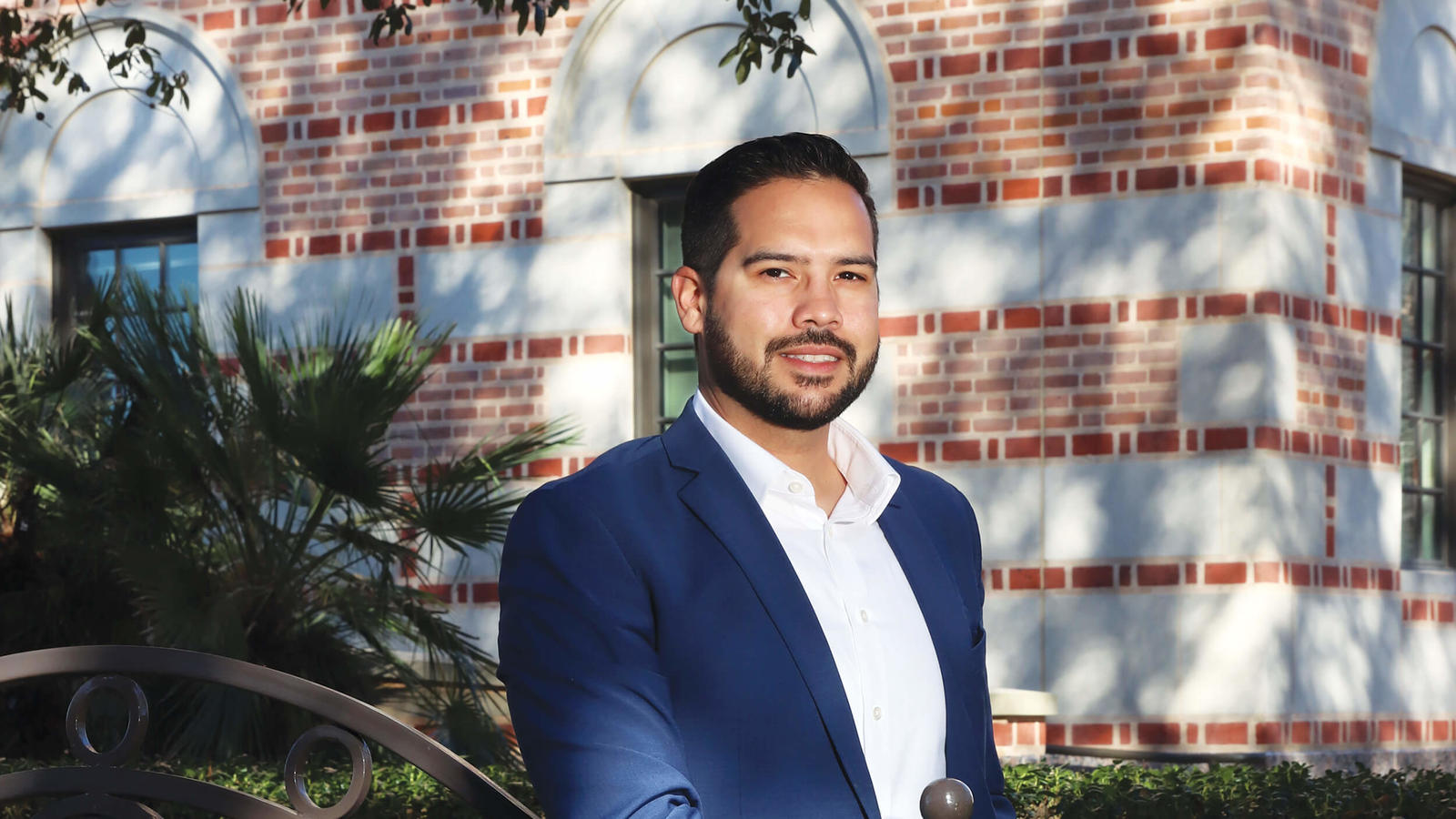
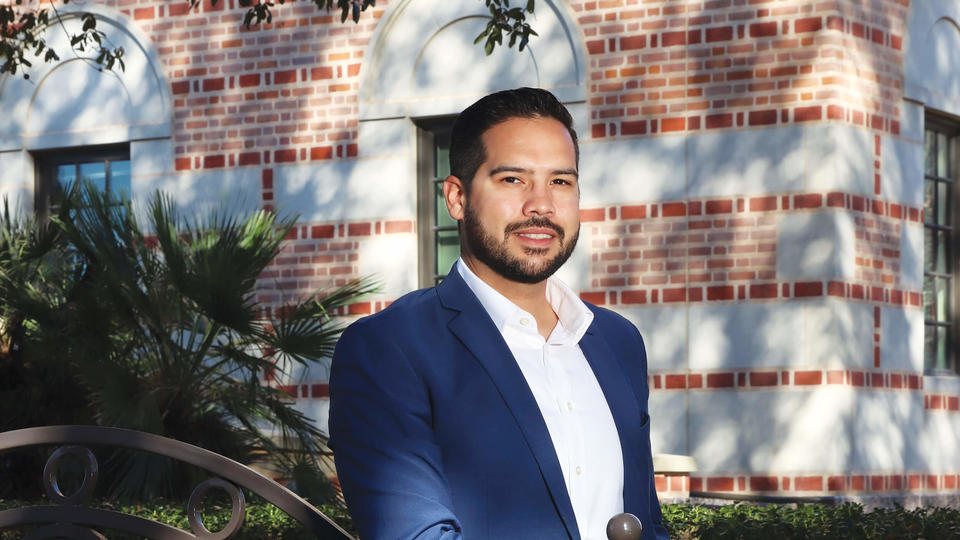
The EMBA program is all about learning from each other —getting the perspectives of a diverse group of seasoned professionals who have already accomplished a lot. Going through this with them in the midst of a pandemic, when we’re all facing challenges, we’ve really leaned on each other.
Luis Rodriguez, EMBA ’22
Luis Rodriguez has gotten where he is today by embracing risk, starting very early in his energy industry career. “I remember sitting in a young professionals meeting, and the regional CEO asked, ‘How many of you want to be CEO one day?’ A good percentage raised their hands — including myself. He said, ‘I hate to break it to you, but maybe only one of you will be a CEO. The reason is: You won’t take the risk. You won’t make yourself uncomfortable.’ ”
Rodriguez accepted the challenge. He took on a series of uncomfortably far-flung assignments in places like Israel and Trinidad and Tobago, among others, and later uprooted his young family from Texas for a post in Dubai. The risks paid off, and he advanced from a project controls position to strategy roles, and eventually to his current position as director of mergers & acquisition and strategy at KPMG. He decided to pursue his MBA at Rice Business to take the next step toward his dream job as strategic advisor to a CEO. “I want to take the tools I learned here and help an organizational leader not only develop a strategy but be able to execute that strategy,” he says.
Working full-time while taking classes and raising three daughters with his wife has been tough, of course. But Rodriguez is used to overcoming hardship. He originally moved to Texas from Puerto Rico as an 8-year-old who spoke little English, with a single mother who worked as a florist during the day and took classes at night. They lived with an aunt until his mother could afford a one-bedroom apartment, and slowly built a furniture collection paycheck by paycheck. “It took 11 years of sacrifice and hard work for her to be able to buy her own home,” he recalls.
Now Rodriguez takes nothing for granted. “For me, the Rice Business experience is unbelievable,” he says. “I never thought that from the background I have, that I’d ever have this opportunity. I still have to pinch myself sometimes.”
Keep Exploring
Keyuri Popat EMBA '21
What Keyuri Popat ’21 is gaining from the EMBA program


One of the things the MBA program has given me is confidence — the feeling that there’s nothing I can’t explore.
Keyuri Popat, EMBA ’21
As an anesthesiologist at the University of Texas MD Anderson Cancer Center, where she is also a professor and the medical director of the hospital’s Acute Pain Service, Dr. Keyuri Popat treats patients with complex pain, which can stem from their illness as well as from the treatment they’re undergoing to cure it. It’s a difficult job, but the emotional payoff is huge. “It’s so rewarding because you can give people instant relief,” she says. When she started thinking about ways to move from treating individual patients to improving the patient experience across the board, she turned to Rice Business.
“Over the last 20 years that I’ve been practicing, the business of medicine has changed quite a bit,” she says. Facilities are now run by a combination of physician leaders and professional administrators, and the two levels of leadership need to understand each other to function seamlessly. “I’m already leading a team of doctors and nurses who manage pain after surgery, so I thought: I could take this to another level and make pain and suffering in our entire patient population as minimal as possible,” she said. “I thought the MBA program would help me get there.” Rice Business was an easy choice: Her husband earned his MBA here in 2016, and her son is an undergraduate at Rice now. He’ll graduate with a degree in computer science at the same time that she earns her MBA.
Equipped with new insights into operations, leadership and innovation, Dr. Popat is leading a pain management committee that brings together stakeholders across MD Anderson to improve pain management for the entire hospital’s inpatient population. “I’m taking a customer experience class now, and it’s fascinating,” she says. “I’m hoping I can apply those lessons to our patients to map their customer journey and improve their full experience — not just in the O.R. or as outpatients, but along their whole MD Anderson journey.”
Keep Exploring
A Love Letter to Our Lost Commutes
Why the disruption of our old routines took an unexpected toll — and how we can fill the void.


Why the disruption of our old routines took an unexpected toll —and how we can fill the void.
None of us shed a tear for the commutes we lost when we first started working remotely. Their loss, we thought, was our gain — an extra hour (more or less) to do whatever we wanted with. Get in a workout! Cook a gourmet breakfast! Or, for some: More time to work!
Now, a year into the COVID-19 pandemic, we’ve started to miss our old routines — even the ones we never valued in the before times. It’s why the “fake commute” has become a thing: people put on “real clothes,” pack a lunch, leave their house, walk around the block, and then go back inside and sit at their desk to start the work day.
These people haven’t cracked: They’re taking an essential step toward rebuilding the boundaries that have blurred during lockdown, according to British researchers. “Engaging in a ‘pretend commute’ at the beginning and the end of the day not only provides an opportunity to build some physical activity into your daily routine but also provides an opportunity to transition between work and non-work parts of lives,” says University College London Professor Anna Cox.
Scott Sonenshein, an organizational psychologist at Rice University’s Jones Graduate School of Business, has been a fan of the fake commute since the early days of lockdown. It started as a way to get his two daughters to settle down for a day of virtual school, he says.
“At first there was nothing — there was no structure, there was no virtual program, and it was quickly obvious that they were languishing. My wife and I divided up the homeschooling responsibilities, and we talked about how to signal when the school day starts and stops,” he says. “I needed that marker for myself, too. So very quickly, probably within the first week, we decided to walk around the block and then come in, and that means you’re in school. They took it seriously — they’d put their backpacks on — but they also had fun with it. After a while they were like, ‘Can we ride our bikes to school? Can school be further away?’ ”
Replacing the old routine with a new one helped make the “new normal” less daunting, explains Sonenshein, the author of “Stretch: Unlock the Power of Less — And Achieve More Than You Ever Imagined” and the co-author, with Marie Kondo, of “Joy at Work.”
“Routines allow us to habituate action. They mean we don’t have to think about certain things; they happen automatically,” he says. “And they provide predictability, which these days is hard to come by. The paradox of the pandemic is that people are struggling with the monotony of lockdown, but we’re also longing for these routines that have been upended. This goes down to the deep-seated need humans have for control — that’s what we’re missing during the pandemic.”
Humans are hardwired to make and keep routines, in part because surprises are biologically alarming to us. We are, at heart, prediction machines, writes Kate Murphy, the author of “You’re Not Listening: What You’re Missing and Why It Matters.” Disrupting the way we’ve always done something — from driving to work to shopping for groceries — pulls the rug of predictability out from under us, sending our brains into a tailspin.
“Our brains are literally overburdened with all the uncertainty caused by the pandemic,” she writes. “Things we had already figured out and relegated to the brain’s autopilot function — going to work, visiting the gym, taking the kids to school, meeting friends for dinner, grocery shopping — now require serious thought and risk analysis.”
In retrospect, our commutes may have been the unsung heroes of our old workdays. Not only did they create a valuable transition between our “on” and “off” hours, they gave us the opportunity to operate on autopilot, freeing up brainpower for new ideas and insights, Sonenshein says.
“Studies show that doing something mindless — just walking around the block or playing with a fidget spinner — allows your mind to wander and make connections. So even though it seems like you’re not working, the brain is working and coming up with ideas. Activities that don’t require a lot of concentration, but stimulate the brain really mildly are typically when the best insights come to you,” he says. “For many of us, those activities were built in to our old workdays. Just having a routine like walking to lunch or walking to get a coffee help make you more productive because you need that space to make the connections that don’t come to you when you’re thinking really hard about something.”
In addition to sparking good ideas, these mundane moments can also increase our sense of joy and purpose, says Samantha Heintzelman, a psychology professor at Rutgers University. By infusing our lives with pattern and regularity, they add a sense of coherence and comprehensibility to the world around us.
“When the world makes sense, life feels more meaningful,” she writes.
And while we tend to think of finding meaning in life as a grand, lightning-bolt moment, Heintzelman’s research shows that it’s more closely intertwined with the small habits we often take for granted: our morning hygiene regimen, our daily coffee runs, our weekly grocery shopping excursions.
“Some correlational research suggests that routines (e.g., consistently sitting in the same seat in a classroom or routinely visiting the same neighborhoods) are associated with feelings of comfort, confidence, safety, and control,” she wrote in a 2018 paper.
Those feelings are the scaffolding around which our sense of a larger purpose is constructed. The good news is that the routines themselves don’t matter as much as the sheer fact that they are routines: regular, reliable and consistent. Every routine was brand-new once, of course, and just doing something new once a day for two weeks will make it feel automatic—and likely to stick, King’s College London researcher Benjamin Gardner tells The Economist. That means the routines we established during lockdown are likely so well established by now that they’ll linger long after the pandemic ebbs.
But it’s never too late to create new routines, Sonenshein says. We can start by letting go of the ones that no longer make sense in our new normal.
“Don’t focus on what you don’t have,” he says. “Find potential in what’s around you. That starts with taking stock of what you’re able to do and the places you can go.”
If your fake commute starts to get old, infuse it with the kind of (limited) novelty you might have done with your real pre-pandemic commute, he suggests. On their “commute” to “school” every morning, Sonenshein and his kids try to spot three new, interesting things each time.
“The commute is always the same, but there’s always at least three new things we notice,” he says. “It could be something new in someone’s yard, a flower sprouting from a gutter, or an interesting doorknob. I would bet you can get through the whole pandemic on your same route and find new things each time.”
The commute itself may be pretend, after all, but the benefits of sticking with it are very real.
Jennifer Latson is an editor at Rice Business and the author of “The Boy Who Loved Too Much.”
You May Also Like
Keep Exploring
Letter From the Dean
A letter from Peter Rodriguez, Dean of Rice Business
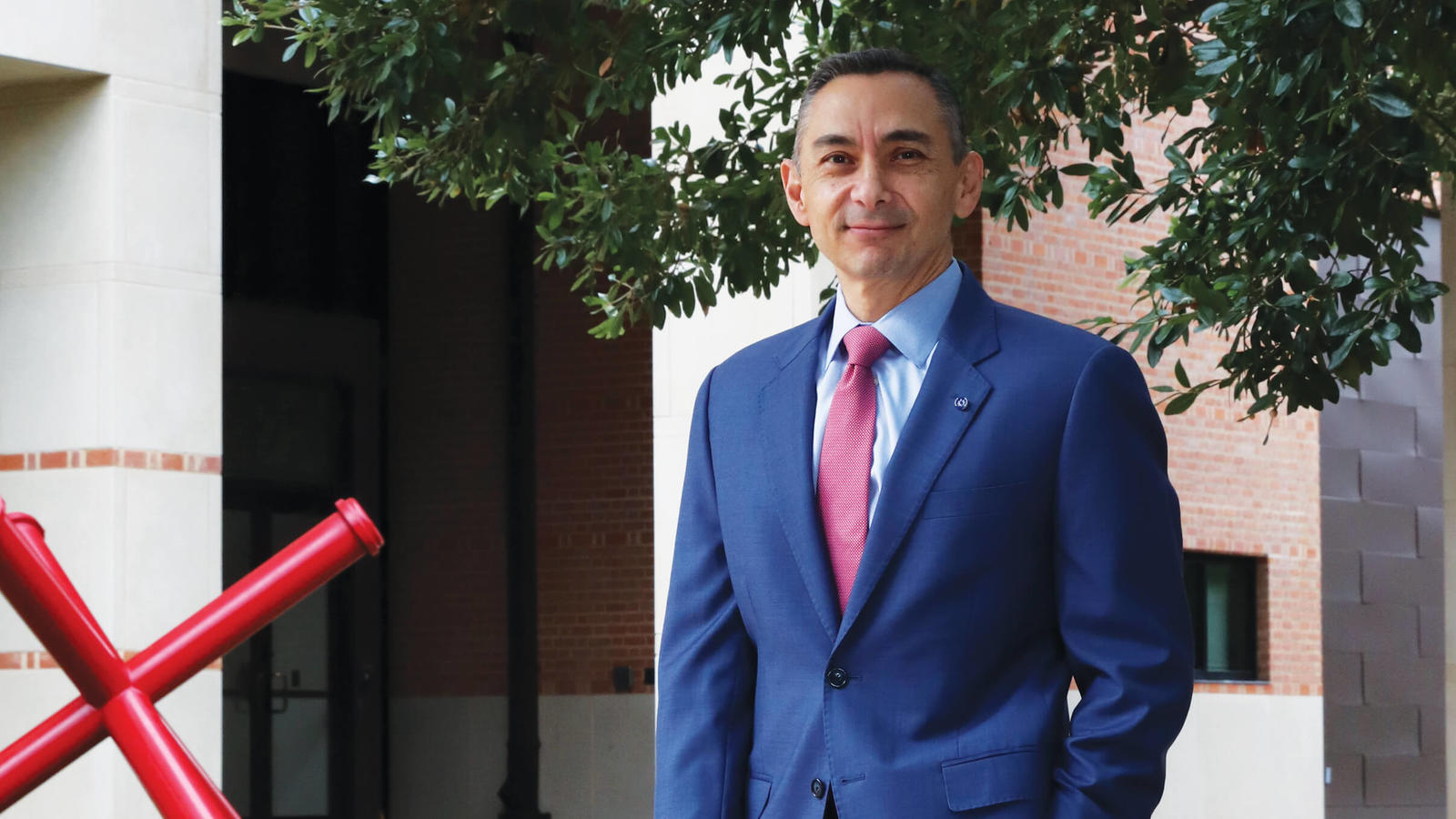
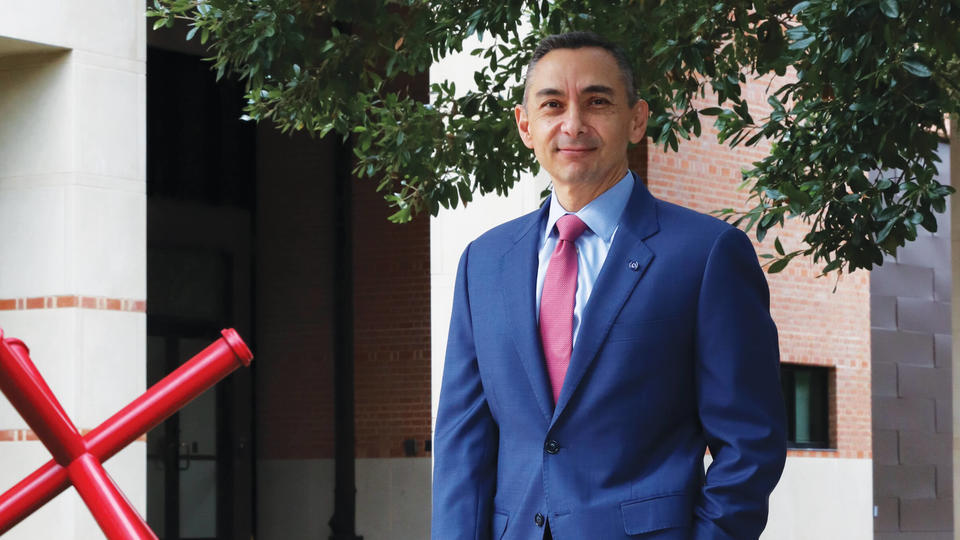
A letter from Peter Rodriguez, Dean of Rice Business
Losing the essentials, such as power and water — and for others so much more — has a way of shifting your priorities and your mindset. The winter storm that devastated Texas in February felt like a final blow in a long and challenging year, especially when we learned that EMBA student Jackie Nguyen lost her mother, Loan Le, and her three children — Olivia, 11; Edison, 8; and Colette, 5 — in a house fire during the disaster.
Sometimes a loss, even if it’s not your own, puts your life in perspective and shapes how you move forward.
Where do we go from here? Houston is back on track. We have clean running water and our power grid is stable once again. How will we become part of the solution the world needs? To help those suffering from power and water outages during the winter storm, we opened McNair Hall to families of students, faculty and staff (see “Huddling Up”). To address the ongoing pandemic, Rice remains committed to policies that keep our community safe (see “COVID, One Year Later”). To address issues of racial equity and social justice, we have established a new position leading our Diversity, Equity and Inclusion efforts (see “Expanding DEI”).
The way to overcome challenges like we’ve seen over the past year is to commit to being a part of a community. The healing power of community is one of the core beliefs at Rice Business. We strive to be better at what we do and be of use to those who need us.
The stories in this issue reveal some of the ways our community provided shelter from the storm and lit the path to our future. Catch up on what students, staff, faculty and fellow alumni are doing to build community and make the world a better place.
— Peter
Keep Exploring
Rethinking the Border
In recent years, restrictive immigration policies have undercut industries from technology to higher education, including at Rice Business. Easing those restrictions could help schools and companies attract top talent and regain a competitive edge, experts say.


In recent years, restrictive immigration policies have undercut industries from technology to higher education, including at Rice Business. Easing those restrictions could help schools and companies attract top talent and regain a competitive edge, experts say.
The past four years have seen some of the most restrictive immigration policies in generations take effect in the U.S. Experts are still analyzing the full effect of those policies, but it’s clear that they’ve taken a toll on a broad swath of industries, including higher education. The restrictions dealt a major blow to Rice Business and countless other academic institutions, making it harder to recruit the best and the brightest from around the world.
At Rice Business, enrollment was down among talented candidates who would otherwise have set their sights on the school from abroad. Stress was up among those who had already made the journey. And the ripple effects were felt across the board.
“It’s taken an emotional toll on our staff and on many of the students whose classmates are struggling under the anxiety that comes with all of those policy changes,” said Rice Business Dean Peter Rodriguez. “The pain you feel is knowing that the foreign students who did so much to come to your country and study with you just can’t relax and feel welcome.”
The situation is especially troubling considering how important international students are to the Rice Business experience, providing access to a global pool of talent and to an inherently diverse body of experiences and opinions.
“We learn from and with each other in the classroom, and the perspectives and backgrounds of international students are irreplicable,” Rodriguez says. “We could not produce the type and the value of education we do without them.”
The same issue applies to all U.S. companies looking to attract top talent and stay competitive in the global market, he says. And while Rodriguez is guardedly optimistic that the next few years could bring welcome policy changes, experts agree that it will take time to rebuild the reputation of the United States as a country that welcomes immigrants rather than shuns them.
New Bottle, Old Wine
The restrictions of recent years, including the so-called Muslim ban on immigration from countries in Africa and the Middle East and a drastic reduction in the number of refugees admitted to the U.S., were far from the first time America has cracked down on newcomers.
“It’s not as if this is something new. It’s as American as apple pie,” says Steve Klineberg, founding director of the Kinder Institute for Urban Research and Professor Emeritus of Sociology at Rice. “Whenever we have a large wave of immigration, we have a nativist response.”
The Immigration Act of 1924, for example — which Klineberg describes as “one of the most viciously racist acts ever passed by Congress” — completely excluded immigrants from Asia and imposed strict quotas on those from Southern and Eastern Europe.
Unlike previous attempts at reshaping the immigration system, however, virtually all of the policy changes of the past four years were made via executive actions and administrative maneuvers rather than through legislative action by Congress. This has implications for the Biden administration, since anything done by presidential fiat can be similarly undone. But that raises the prospect of successive administrations reversing those reversals, and of immigration policy becoming a perpetual political football.
“Nothing that is done from the president’s desk as an executive order is a permanent solution,” says Tony Payan, director of the Center for the United States and Mexico at Rice’s Baker Institute for Public Policy.
To achieve both rapid and lasting change, the Biden administration will therefore need to work along parallel tracks, Payan says. On the one hand, it can issue executive actions to quickly overturn selected Trump-era policies. On the other, it must court congressional support for comprehensive immigration reform that would combine some form of legal status for undocumented immigrants with enhanced border security and a more rational approach to employment-based visas.
That dual focus was evident in President Biden’s first flurry of immigration-related moves. Those included not only executive actions to end the Muslim ban and halt the aggressive deportation of unauthorized immigrants, but also a call for legislative action to provide the latter with permanent status and a path to citizenship — something that would represent the most ambitious congressional overhaul of immigration law in decades.
Short Game, Long Game
When it comes to executive actions, some reversals can be effected immediately, experts say. That includes reinstating visa programs that allow international students to attend schools such as Rice and secure employment with American firms.
Guidance issued by the previous administration regarding visas made it much harder, and in some cases impossible, for foreign nationals to study and work in the U.S. Undoing that guidance would be good not only for foreign jobseekers but for American companies, too: The kneecapping of the H-1B visa program, for example, has made it possible for only the largest firms to assume the costs and burdens of hiring foreign workers, leaving smaller firms unable to compete for global talent.
“That’s not good for competitiveness or equity,” Rodriguez says.
Fully reversing the effects of specific immigration policies through the use of executive actions will take time, but getting the ball rolling involves little more than a stroke of the presidential pen. In the long run, however, comprehensive legislative reform will require the current administration and its allies to make the case for immigration to the American people.
Fortunately, it’s a compelling one. America’s future depends on immigration: The fertility rate for native-born Americans has fallen below the so-called replacement rate, meaning that the country can no longer replenish its own population — or its workforce. That, say Rodriguez and Payan, represents a looming demographic crisis of the sort that has inflicted so much economic pain on Europe and Japan.
At the local level, Klineberg already sees the writing on the wall. His own research shows that Houston’s growth has been driven entirely by immigration since 1982, with a steady influx of new arrivals fueling the city’s diversity and economic vitality. “No city has benefited from immigration more than Houston,” he says.
With pent-up demand for labor across all skill levels in industries ranging from engineering and medicine to construction and daycare, the importance of immigration to the economy will only grow: A report by the Center for Houston’s Future predicts that by 2036, 57 percent of all new jobs in Houston will be filled by immigrants.
And while critics contend that immigrants take American jobs from native-born workers, the idea of immigration as a zero-sum game ignores the extent to which immigrants help grow the economic pie for everyone, Rodriguez argues.
“It is certainly true that immigrants compete for the jobs that we all compete for,” he says. “On the other hand, immigrants of all types bring skills we need and make the U.S. much more productive. And it’s that general productivity that converts this from being a zero-sum proposition into something that makes the economy larger and more successful overall.”
Alexander Gelfand is a freelance writer based in New York City who often covers business, science and social justice.
You May Also Like
Keep Exploring
Huddling Up
When dangerous cold weather hit Houston in February, the Rice Business community banded together.


When dangerous cold weather hit Houston in February, the Rice Business community banded together.
The lights went out at Aman Bhargava’s place in the Rice Village Apartments around 2 a.m. on Monday, Feb. 15. As the day passed, the apartment got colder. The pipes froze, cutting off the water supply. And the temperature — inside and outside — was only going down.
Bhargava, a full-time MBA student in the Class of 2021, hadn’t expected to lose power and water during a Houston cold snap. Luckily, he still had some bottled water left over from his preparations for a summer hurricane that never materialized. But he had no canned food and little to keep him warm in the Arctic indoor conditions that developed as the outage dragged on into Tuesday.
A number of his classmates, he realized, were in the same boat — many of them international students, like him, living in the Rice grad student apartments where conditions were quickly deteriorating. Two emails from Rice Business gave him hope: One said there was still power and water in McNair Hall. The other said anyone who needed help should contact administrators. So he did.
“I reached out and said, ‘Can we shelter at school?’ ” he said. The answer was yes.
Bhargava and his RVA neighbors joined dozens of others who sheltered at McNair Hall the week of Feb. 15, including business school faculty, students and staff, along with members of Rice’s “ride-out team” of essential personnel who stay on campus during disasters. The building never lost power or water during the winter storm that caused widespread outages throughout the region, when temperatures dropped to lows not seen since 1989.
On Tuesday morning, Bhargava channeled his energy into mobilizing the other Rice Business students at his apartment building, compiling their personal details to share with the Rice University Police Department, which approved their plan to camp out at McNair. Then he booked them an Uber, which took an hour to arrive on icy roads — plus another 25 minutes to make the short trip from the apartments to campus, which normally takes about five minutes.
“I’m so glad the driver showed up and was patient,” Bhargava said. “Every time we got to an intersection, it was either closed or too icy, so we had to turn around and find another way.”
When they finally made it to McNair, they faced a new problem: How to feed everyone in the building. Restaurants and grocery stores were closed, and the roads weren’t safe for deliveries in any case. But Bhargava coordinated with Adam Herman, executive director of the Student Program Office, and Joe Garcia of Elite Events Houston, which handles catering for Rice Business. They got in touch with David McDonald, senior director at Rice Housing and Dining, who immediately said the students were welcome to eat at one of the Rice undergraduate dining halls, South Servery, shared by Hanszen and Wiess colleges. Later in the week, Garcia provided meals on site in McNair Hall: enchiladas for lunch on Thursday and pad thai on Friday.
After meeting the basic needs for food, water and heat, McNair became a sort of cold-weather summer camp. Herman — who coordinated the impromptu housing effort along with Rice’s crisis management team, RUPD and other Rice Business administrators — started referring to the building as Hotel McNair for its overnight guests, who were given cots to sleep on, and Camp McNair for those who came by during the day to charge devices, warm up, and take showers.
“The mood with everybody there was kind of a quiet thankfulness,” said Elizabeth Walton, a full-time MBA student in the Class of 2022, who spent two nights camping out in a breakout room with her husband and their dog. “I’m just so grateful to have Rice Business, and that McNair Hall randomly has showers.”
Everyone was still careful to wear masks and keep their distance, but for many students, it was the most in-person time they’d spent with their classmates in a year. No one was in the right frame of mind to do classwork, Walton said, but some played board games and watched movies together.
“It was fun to be around other people instead of alone in your cold, dark apartment,” she said. “There was a lot of camaraderie — we were all in it together.”
“With the way COVID has been, I haven’t been able to meet many first-years. But because of this winter storm, I was able to not only meet but to have meaningful conversations with some of them. It was nice to have someone in the same situation as you are and talk to them about how they’re managing,” said Bhargava.
The “crisis within a crisis” not only brought people together, but it brought out the best in the Rice Business community, said Herman.
“This was an opportunity for the school as an organization to show up for students, faculty and staff, but also for students like Aman to show up for his fellow students and form something that was organic in McNair,” he said.
Students mobilized to help people in need off campus as well. Professional MBA students supporting a nonprofit called Amel Houston as part of a Capstone course started an impromptu initiative to help those in Houston’s refugee community after the storm.
“What started with few texts quickly became a community initiative, where our efforts coupled with the generosity of corporate sponsors (H-E-B, Target), restaurants (Dimassi’s, Fadi’s), Rice MBA classmates and neighborhoods helped contribute 75 meals, tons of water and about $1,000 worth of basic supplies to refugees,” said Arthi Vasudevan ’21.
As power and water came back on across Houston, Hotel McNair reverted to its primary purpose as an academic building. Bhargava packed up and returned to the Rice Village Apartments on Thursday. Recovering from the stress of the ordeal took a little longer.
“Because of the pandemic, it’s not going back to ‘normal,’ ” he said. “It’s going back to the ‘new normal.’ But I have power and water now, so it’s a little easier.”
Tragedy in the Rice Business Family
A house fire during the winter storm claimed the lives of a student’s mother and three children.

The severe freeze that devastated Texas in February caused at least 25 deaths in Harris County alone, the Harris County Institute of Forensic Science reported in March. Tragedy struck the Rice Business community when Jackie Nguyen, EMBA ’21, lost her mother, Loan Le, and three children — Olivia, 11; Edison, 8; and Colette, 5 — in a fire at her home in Sugar Land while the family tried to stay warm. Jackie was hospitalized with injuries from the fire but is recovering.
“The depth of this loss is unimaginable,” Dean Peter Rodriguez wrote in a letter to the Rice Business community. “Measured against it, our sympathies seem so feeble. Still, even now, we know that sharing our love and expressions of comfort with Jackie is needed and meaningful. I hope that you will join her classmates in the EMBA class of 2021 in their loving support and compassion for Jackie. The hearts and prayers of all of us in the Rice Business family are and will remain with her and her family in this sorrowful moment.”
Jackie’s classmates rallied to help her, providing clothing and essentials, cleaning up from the fire, and donating to a GoFundMe account with the aim of creating a foundation to honor the memory of Olivia, Edison and Colette. By the time of the children’s funeral services in early March, the account had nearly reached its goal of $500,000.
On the Slack channel houston4jackie.slack.com, there’s been an outpouring of love and support from all who knew Jackie’s family — and many who didn’t.
“Jackie, your children truly became honorary members of our EMBA 2021 class this past year during the many hours spent together over Zoom,” wrote her classmate Matthew Goldsby ’21 in one Slack thread. “I will never forget their smiling faces peeking over their computer screens, in particular one day when a professor suggested that grades do not really matter. Their mischievous grins and pure delight in that moment will never fade in my memory.”
“This really made me smile,” Jackie wrote. “I also feel like they were beside me on our MBA journey... and am just so sad that they won’t get to see us walk. They were so looking forward to it. Love y’all so much.”
Those who want to offer support but don’t have Slack can also email houston4jackie@gmail.com.
You May Also Like
Keep Exploring
Exit Strategy
Rice Business professor Marlon Mooijman explains why too much power can breed mistrust — and make it hard for leaders to take an exit cue.


Rice Business professor Marlon Mooijman explains why too much power can breed mistrust — and make it hard for leaders to take an exit cue.
In business, as in politics, transfers of power aren’t always seamless — and when threatened, the powerful sometimes dig in their heels. After the nation’s top elected official struggled to accept his ouster in the 2020 election, management scholars reflected on similarly fraught leadership successions at organizations both large and small. For insight into this dynamic, we spoke to psychologist Marlon Mooijman, an assistant professor of organizational behavior at Rice’s Jones Graduate School of Business. With a focus on the interrelation of power, trust and status, Mooijman’s research offers a unique perspective on the current political moment — and its connection to organizations well beyond the arena of government.
How does your work dovetail with the post-election period?
What’s most relevant is the question of someone’s willingness to give up power, to relinquish control. We define power as controlling something others desire: a business budget, government funds. That control gives people power because it makes others want to do things for them, to gain access to that desirable good. As a consequence, gaining and having power is nice, and losing it is not. And that’s as relevant an issue for CEOs as for politicians.
What are the conditions under which leaders find it particularly hard to give up power?
My research suggests that on the way to the top of the corporate ladder, leaders lose trust in those around them. They start to think of the managers below them as doing their bidding only because those direct reports want something the leader has to dole out: more budget, bigger bonuses, promotions. As a result, leaders don’t trust that others are working for them because of their own good will.
In a Machiavellian way, leaders come to see interactions with those below them as all about political maneuvering, and they start to feel like they have to always be on their guard, so they don’t get taken advantage of.
And that makes it hard to cede control?
The more power you gain or exert, the less you trust. And the less you trust, the more you feel like you have to rely solely on your power to get things done.
The longer people stay in power, meanwhile, the more cynical they get about trust. Leaders find they have to use more and more power to hold on to power.
So they crowd out trust, they crowd out the possibility that people are willing to follow them voluntarily, and their leadership starts to rely on force and domination. People then exhaust every option to keep power.
How do organizations resolve this problem? How do they get rid of a power-mad leader who’s really dug in?
It often requires creating a cushy way out. If a board wants the CEO out, its members need to think about what’s important to him or her, what’s the underlying concern. Everyone is different. Is it really just about holding on to power?
My takeaway is, organizations have to focus more on making outgoing CEOs feel like they’re still esteemed, admired, and that they will be moving forward. Maybe that’s about some sort of honorary title, emeritus status, maybe it’s about still having a parking spot.
It’s about money, too, of course. You have to buy people out, that’s standard. But what often goes unrecognized is that departing CEOs want a good way out in terms of how esteemed they seem. Ultimately, it’s about respect.
If you’re a CEO who’s maybe failing a bit and then asked to leave, it’s embarrassing. Leaders get trapped in a phenomenon that’s called escalation of commitment: When doing poorly, they want to invest more time, more energy and money into saving their reputation. A way out of that cycle is to provide an exit that saves face.
What’s the relationship between the power-trust dynamic and this desire for respect?
In my field, we make a distinction between power, which is controlling resources, and status, which is about respect and admiration. If I have power, that tends to undermine trust. Because I have something desirable, I become more cynical about others’ motives. But if I think others admire me, I tend to trust them more.
If an organization can make people feel respected and admired, it becomes an environment where inclusion is prevalent, and trust goes up. If a workplace has more power hierarchies, it creates more distance and less trust.
Does that mean there should be no hierarchies?
Every organization needs to have some sort of power hierarchy. But there are other ways to boost inclusion and trust: Minimizing a focus on different titles; deemphasizing the degree to which people have access to different levels of resources and the degree to which people occupy clearly different spaces and types of offices based on their titles and level of power. If an organization can do that, it feeds into an idea of employees being close to each other instead of far away.
What steps can organizations take to make that happen?
I've been in corporate board meetings, where people smack the table and say basically, “I'm the boss, so I decide.” Sure, that’s true. But you destroyed all your authority in that moment.
Instead, you have to focus on culture, and culture starts at the top. Studies show that when CEOs place high levels of trust in managers right below them, that trickles down. That’s not a surprising outcome maybe, but it’s nice to know that research bears it out: You can change the trust dynamic in a company when you make changes at the top.
What does that mean for the country moving forward?
The tone at the top matters. The president sets the tone, the norm, the implicit understanding of what's acceptable. So it’s important to have those in charge foster trust and respect throughout an entire organization — or, in this case, the whole nation.
Andrew Sessa is a Boston-based writer and editor.
You May Also Like
Keep Exploring
COVID, One Year Later
We made it through the darkest days of the pandemic. Now things are looking up.
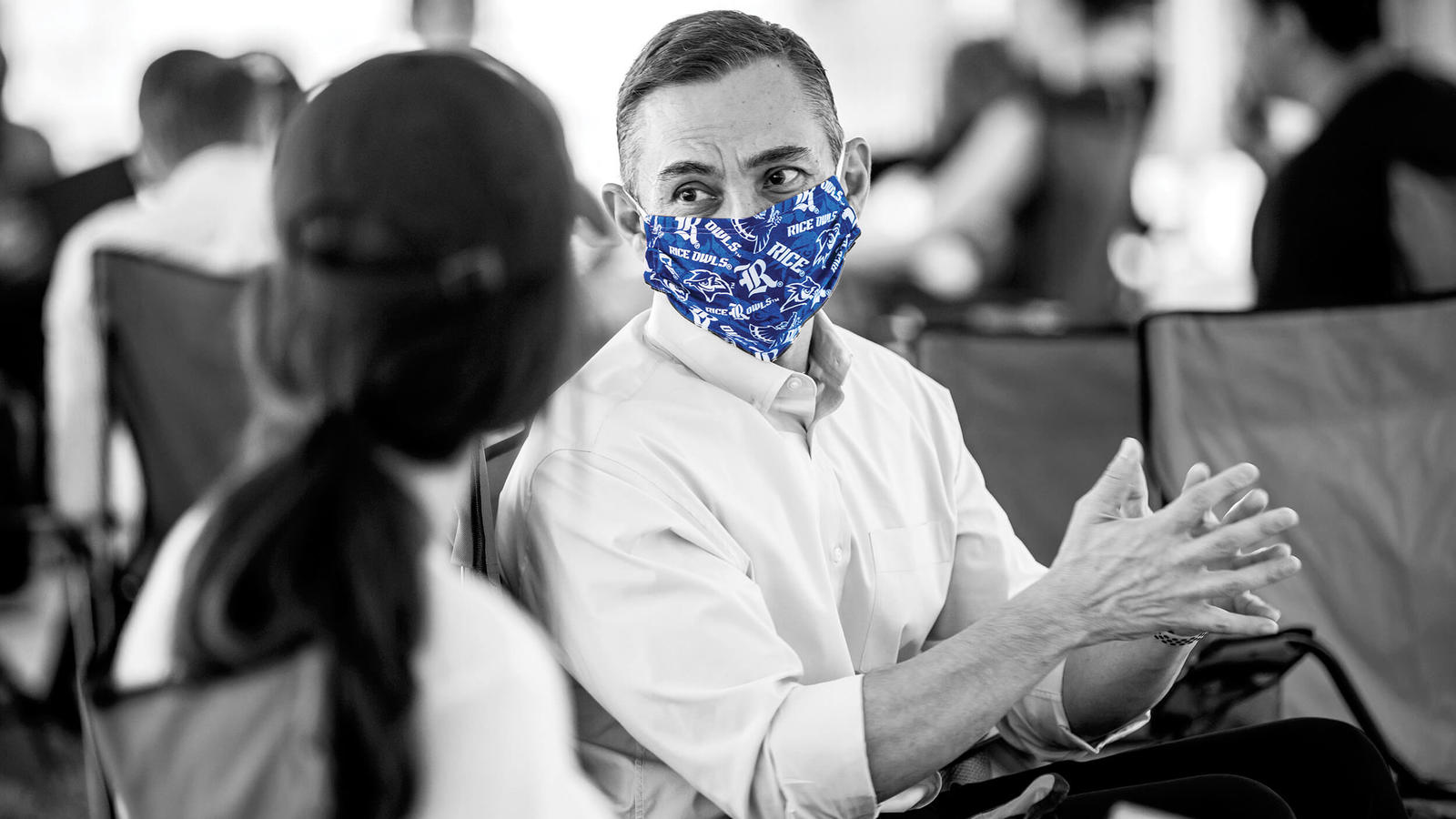
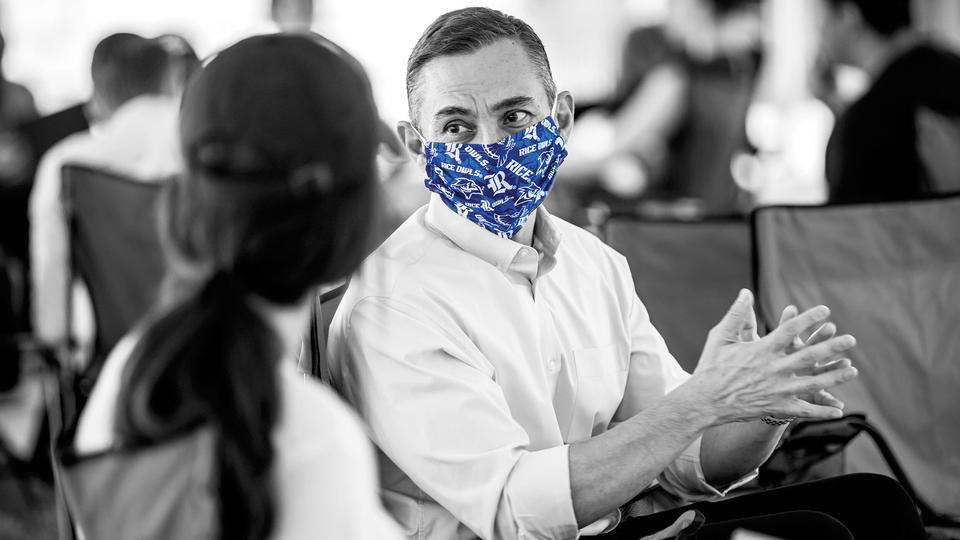
We made it through the darkest days of the pandemic. Now things are looking up.
It’s been a year.
Rice first canceled in-person classes the week of March 9, 2020, after a university employee tested positive for COVID following a Nile River cruise. As the coronavirus pandemic started sweeping the U.S., Rice was the first Texas university to issue major cancellations, out of “an abundance of caution.” Abundant caution quickly caught on, of course, and other schools soon followed suit.
What at first seemed like it would last a few weeks, prompting us to panic-buy toilet paper and canned goods as if we were preparing for a hurricane, became our “new normal,” a seemingly indefinite life in limbo as restrictions eased and tightened through several pandemic peaks.
Rice Business moved all classes online for the spring semester on March 16, 2020. When classes resumed in the fall, we delivered courses using a hybrid model that meant students could choose whether to attend classes in person or virtually. To ensure a high-quality online experience, we made a $1.2 million investment in classroom technology and provided professors with additional support staff to eliminate technical difficulties. Our faculty — who delivered classes from their homes, their offices and live in the classroom — were supported by classroom ambassadors (our COVID-era teaching assistants) and technology TAs who made sure that classes were inclusive and accessible to students attending remotely. About 75 percent of students across our programs, however, chose in-person learning.
We successfully navigated the fall semester with precautions in place to keep everyone in the community safe. Everyone on the Rice campus was required to wear masks and undergo regular COVID testing. We moved events outdoors wherever possible, and we limited the number of people in classrooms and public spaces to ensure that everyone kept a safe physical distance. That allowed us to deliver courses on schedule and enable students to make progress toward earning their degrees on time. It also kept the virus from spreading. Since the beginning of this academic year, Rice has conducted more than 120,000 COVID tests, with a positivity rate of 0.27 percent.
After the winter holidays, a surge in cases nationwide and in Houston meant that Rice, and Rice Business, began this spring semester remotely once again. In mid-February, we returned to hybrid instruction — a week later than planned, due to the devastating storm that blanketed Houston in snow and ice.
As COVID vaccines become more widespread, we hope that the newest normal will start to more closely resemble our old normal. In March, Rice announced in-person graduation plans for both the class of 2021 and 2020. We’re excited to hold the Rice Business Investiture on May 14 — and even more excited that the university’s commencement plan recently expanded to allow each graduate to invite up to four guests to celebrate this special day in person. Our ceremony will be held Friday morning at 8:30, and will still be livestreamed for remote viewing by anyone who cannot attend in person.
Meanwhile, this year’s alumni reunion is a weeklong virtual event, from April 18 to 24, with plenty of online programming, including the Rice Business Alumni Awards, school updates, webinars, coffee chats and more.
We are hopeful that the accelerated availability of COVID vaccine doses will lower overall public health risks from the virus and increase our ability to safely gather in larger groups. Along with COVID testing, Rice has been providing vaccines to eligible faculty, staff and students — and doing its part to help vaccinate the surrounding community. On March 15, Rice Stadium began operating as a community vaccination site serving the entire Houston area. The vaccine clinic, one of several operated by Baylor St. Luke’s Medical Center, heavily emphasized vaccinating underserved populations in Houston.
The indicators are improving, nationally and in Houston. We can see the light at the end of the tunnel. The sacrifices we’ve made have helped get us here. It’s no surprise that the Rice Business community has been agile and adaptive in the face of uncertainty. Most importantly, we’ve supported each other through this dauntingly difficult period. We hope that soon we can celebrate, together, our return to “regular life.”

